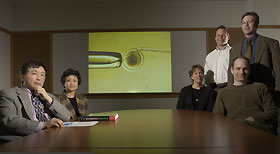For more archives, go to the Advance Archive/Search Page.
Second Generation Cloned Bull
Alive And Well, Say Researchers
Scientists at UConn and their Japanese colleagues have confirmed two live births of second-generation clones from a famous Japanese breeding bull. The research suggests for the first time that serial cloning - cloning of a clone - of a large animal could become commercially viable.
 |
|
Researchers at the Center for Regenerative Biology,
from left, seated, Jerry Yang, Cindy Tian, Joanne Conover, and David
Goldhammer, and standing, William Fodor, left, and Theodore Rasmussen. The
team, with Japanese colleagues, recently announced the successful cloning
of a cloned bull. |
The second-generation cloned bulls were born on Jan. 23, 2000, and March 6, 2000. Although one of the two calves died of anemia and infection shortly after birth, the second has survived for more than four years in apparent good health, indistinguishable from naturally reproduced peers. It also has sired six offspring.
"The reason that we held off reporting this major achievement until now is that we wanted to be sure that the second-generation bull clone could mature normally and prove fertile, with its health certain," says Xiangzhong (Jerry) Yang, professor and director of the University's Center for Regenerative Biology, who led the research team. "Only then should we claim success."
A paper describing the technique used to produce the second-generation bull clones appeared in the May 23 issue of the journal Nature Biotechnology.
The research is the result of collaboration between the laboratories of Yang and Chikara Kubota of the Kogashima Cattle Breeding Development Institute in southern Japan.
Kubota previously worked in Yang's laboratory at UConn. The surviving second-generation bull clone was given the Chinese name Sho-zaburo ("Little Boy III") and the Japanese name Kamitakafuku ("God of High Happiness").
The second-generation clone is the descendant of a genetically elite, 17-year-old Japanese Black bull that had sired more than 160,000 offspring in Japan. In 1998, Yang and Kubota successfully produced four cloned calves from the ear skin cells of the bull. These clones represented the world's first male clones of a farm animal.
Ear skin cells were then collected from one of these cloned bulls for re-cloning - a technique known as somatic cell nuclear transfer cloning - leading to the birth of the world's first second-generation clone in a non-rodent species.
"Despite high rates of fetal and newborn mortality, surviving cloned cattle are generally normal and healthy," write the authors of the new study.
In Japan, scientists hope to use cloning technology to improve the breeding of beef cattle to obtain animals with higher quality meat. Serial bull cloning may be of practical benefit in that country's cattle industry, for reproducing valuable animals quickly. In conventional breeding programs, it may take six or seven years to select a genetically elite stud bull from hundreds of peers, because of the lengthy process of testing for desirable traits to pass on to progeny.
Serial cloning also has significant potential for further research, say the authors of the study: "Serial bull cloning, in addition to its potentially practical import, would provide an excellent model to study the effects of progressively accumulated somatic mutations on development, health, and reproductive performance."

